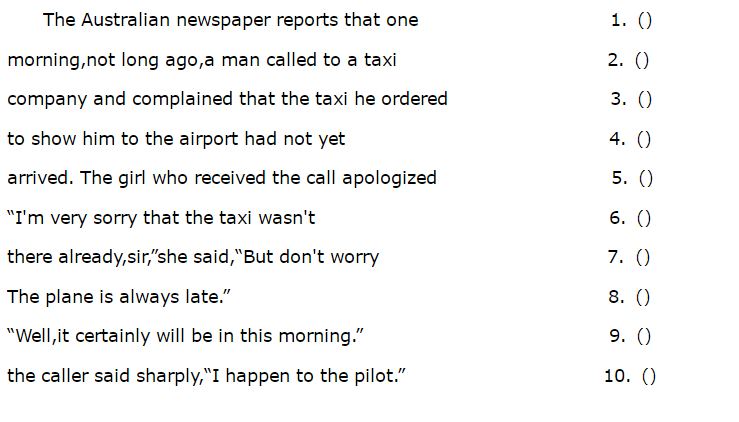2022年高职单招每日一练《英语》10月18日
考试总分:10分
考试类型:模拟试题
作答时间:60分钟
已答人数:1267
试卷答案:有
试卷介绍: 2022年高职单招每日一练《英语》10月18日专为备考2022年英语考生准备,帮助考生通过每日坚持练习,逐步提升考试成绩。
试卷预览
-
1. In those days,the old woman () sit at the gate for hours,waiting for her son to return from the front.
Awill
Bshould
Cwould
Dwere going to
-
Since the beginning of time,man has been interested in the moon. The Romans designed a special day to show admiration and respect to the moon. They called it “Moonday”,or“Monday”,as we know it today. Later,the great mind of Leonardo daVinci studied the moon and designed a machine to carry a human to the moon.Leonardo said that one day a great machine bird would take a person to the moon and bring great honour to the home where it was born.
Four and a half centuries later,Leonardo's idea was realized. ApolloⅡtook three Americans-Collins,Aldrin,and Armstrong to the moon. The mission(任务) did fill the whole world with great surprise,as Leonardo had said it would. Numerous essays,articles,and books were written about man's first moon mission,But perhaps the most interesting story was one written before the event—over 100 years before.
In 1865,French author Jules Verne wrote a story about the first journey to the moon. His story was very similar to the 1969 Apollo II mission.
Verne's spacecraft also contained three men,two Americans and a Frenchman.The spacecraft was described as being almost the same size as ApolloⅡ. The launch(发射) site in Verne's story was also in Florida. The spacecraft in Verne's story was named the“Columbial”. The Apllo II command ship was called“Columbia”. His account of sending the spacecraft into the space could easily have been written about how ApolloⅡwas sent into the space.
Verne's story was the same as the actual event in several other aspects. The speed of Verne's spacecraft was 36000 feet per second. Apollo's was 35533 feet per second. Verne's spacecraft took 97 hours to reach the moon. Apollo's time was 103hours. Like Apollo's spacemen,Vern's spacemen took pictures of the moon's surface,relaxed on their seats,cooked with gas,and experienced weight lessness. They too came down in the Pacific and were picked up by an American warship.
What were the reasons for Jules Verne's extreme accuracy in describing an event
100 years or more before it actually occurred? He based his writings on the laws of physics and astronomy. Nineteenth-century science and the vivid Verne's imagination gave people an unbelievably accurate preview of one of the greatest event of the 20th century.
2. The passage mainly describes _ .A the rapid progress of mankind
B Verne's accurate preview of the future.
C the 1969 ApolloⅡmoon mission
D the19thcentury's science and technology
-
Passage A
King's College offers an annual(每年的) training program for high school students at all levels who want to improve their English. Courses are given by the teachers of King's College and other colleges in New York. Trips to museums and culture centers are also organized.
The courses for this year will be from December 26th to 30th. More information is as follows:
Application date
Students in New York should send their applications before December 22nd, 2014.
Students of other cities should send their applications before December 20th, 2014. Foreign students should send their applications before December 18th, 2014. Courses
English Language
Spoken English: 22 hours
Reading and Writing: 10 hours
American History: 16 hours
American Culture: 16 hours
Steps
A letter of self-introduction
A letter of recommendation
★The letters should be written in English with all the necessary information. Cost
Daily lessons: $200
Sports and activities: $100
Travels: $200
Hotel service: $400
★You may choose to live with your friends or relatives in the same city.
For more information, please contact:
Thompson, Sanders
1026 King's Street
New York, NY 10016, USA
QQ number: 384522980
E-mail: Thompson@ yahoo.com
3. Which of the following statements is NOT true about King’s College?AStudents at all levels can take part in the program.
BVisits to museums and culture centers are part of the program.
CThe training program is run every year.
DOnly the teachers of King’s College give courses.
-
1. 单句改错,选出括号里的错误选项,并改正。[A](Every time) you [B](will pass) a level, you [C](will get) [D](some points) .
-
2. 单句改错,选出括号里的错误选项,并改正。We are [A](thinking) [B](to make) the computer [C](“think”) [D](like a man) .
-
3. 单句改错,选出括号里的错误选项,并改正。We [A](learnt) [B](from) each other [C](since) we[D](became) friends.
-
1. I can't decide which shirt ()(buy).
-
2. 用适当的介词填空,完成句子。This work calls () great care.
-
从下面选择适当的词填空,完成句子,每词只用一次。
under,behind,below,in front of,near,above,inside,outside,over,across
3. The teacher stands () the blackboard.
-
1.

相关试卷
-
2023年高职单招每日一练《英语》9月24日215人做过
-
2023年高职单招每日一练《英语》9月25日228人做过
-
2023年高职单招每日一练《英语》9月26日1436人做过
-
2023年高职单招每日一练《英语》9月27日1479人做过
-
2023年高职单招每日一练《英语》9月28日1173人做过
-
2023年高职单招每日一练《英语》9月29日401人做过
-
2023年高职单招每日一练《英语》9月30日1403人做过
-
2023年高职单招每日一练《英语》10月1日964人做过
-
2023年高职单招每日一练《英语》10月2日1206人做过
-
2023年高职单招每日一练《英语》10月3日1168人做过
相关题库